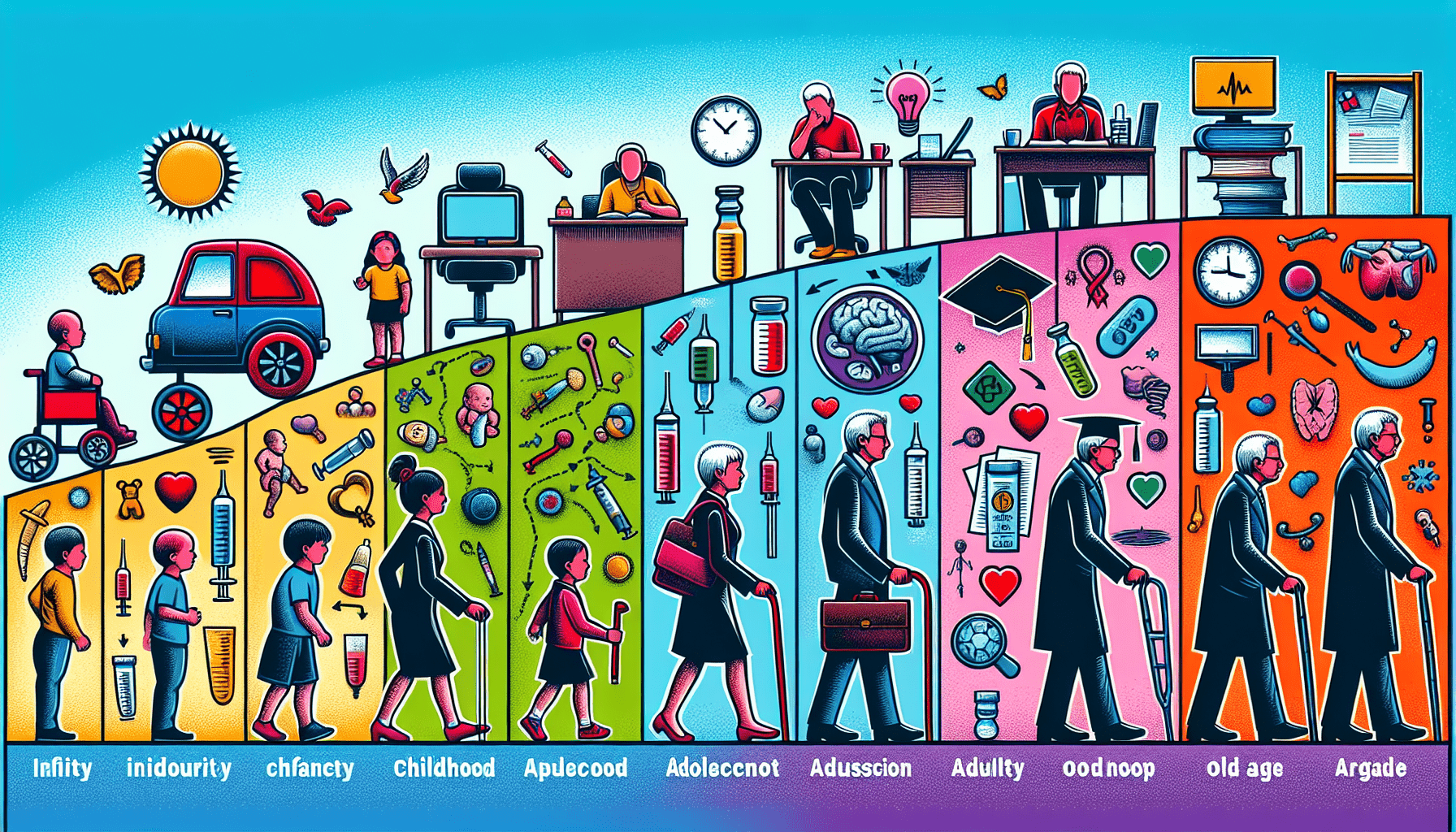Have you ever wondered how our health is influenced by our age? From the moment we are born, our bodies go through various stages of development, each bringing its unique set of health concerns. In this article, we will explore the different health problems that can arise at every stage of life. Whether you are a young child, a teenager, an adult, or a senior, understanding these age-related health issues can pave the way for a healthier and happier life.

Infants and Toddlers
Common infections
As infants and toddlers explore the world around them, they are more prone to common infections. Respiratory infections, such as colds and the flu, are quite common during this stage. These infections can cause symptoms like coughing, sneezing, and fever. Gastrointestinal infections, such as diarrhea and vomiting, can also occur due to their developing immune systems. It’s important to ensure good hygiene practices, such as regular handwashing, to minimize the risk of infections spreading.
Sleep problems
Sleep problems can be quite common among infants and toddlers. They may experience difficulties falling asleep or staying asleep throughout the night. This can be distressing for both the child and their parents. Common sleep problems include night waking, frequent nightmares, and difficulties with sleep transitions. Establishing a consistent bedtime routine, providing a calm sleep environment, and practicing good sleep hygiene can greatly help in addressing these sleep problems.
Feeding difficulties
Feeding difficulties can be a concern during the infancy and toddler stages. Some children may have trouble latching or swallowing during breastfeeding, while others may struggle with transitioning to solid foods. These difficulties can lead to inadequate nutrition and growth delays. It’s important to seek guidance from healthcare professionals and consult with a pediatrician or a feeding specialist to address any feeding difficulties early on. Introducing a variety of textures and flavors gradually, as well as creating a positive feeding environment, can help overcome these challenges.
Children and Adolescents
Obesity
Childhood obesity has become a significant health concern in recent years. Poor nutrition, sedentary lifestyles, and genetic factors contribute to the rising rates of obesity among children and adolescents. Obesity can lead to various health problems, including diabetes, high blood pressure, and cardiovascular diseases. Encouraging regular physical activity, promoting a balanced diet, and creating a supportive environment can contribute to preventing and managing childhood obesity.
Respiratory conditions
Respiratory conditions, such as asthma and allergies, are common among children and adolescents. Asthma is a chronic condition that causes inflammation and narrowing of the airways, leading to difficulty in breathing. Allergies, on the other hand, occur when the immune system reacts to specific allergens, causing symptoms like sneezing, itching, and wheezing. Proper diagnosis, appropriate medication, and avoiding triggers are key components in managing respiratory conditions in this age group.
Mental health disorders
Mental health disorders can affect children and adolescents, impacting their emotional well-being and overall development. Conditions like anxiety, depression, and attention-deficit hyperactivity disorder (ADHD) can present challenges in their daily functioning and social interactions. Early identification, access to mental health services, and creating a supportive environment that promotes open communication can make a significant difference in addressing these mental health concerns and helping children and adolescents thrive.
Sport-related injuries
Participation in sports and physical activities is essential for the development of children and adolescents. However, with increased physical activity comes the risk of sport-related injuries. Common injuries include sprains, strains, fractures, and concussions. It’s important to prioritize safety measures, such as wearing protective gear, warm-up exercises, and proper training techniques. Prompt diagnosis, appropriate treatment, and sufficient recovery time are crucial in managing sport-related injuries and ensuring the long-term well-being of young individuals.
Young Adults and Middle-aged Individuals
Cardiovascular diseases
Cardiovascular diseases, including heart disease and stroke, are significant health concerns among young adults and middle-aged individuals. Risk factors such as unhealthy diets, sedentary lifestyles, smoking, and stress contribute to the development of these conditions. Regular physical activity, maintaining a healthy weight, eating a balanced diet, and managing stress levels are essential in preventing cardiovascular diseases. Regular check-ups and early detection of any potential risk factors can assist in managing these conditions effectively.
Reproductive health issues
Young adults and middle-aged individuals may face various reproductive health issues. Women may experience conditions like polycystic ovary syndrome (PCOS), menstrual irregularities, and fertility challenges. Men may encounter problems such as erectile dysfunction and fertility issues. Regular gynecological and urological check-ups, practicing safe sexual behaviors, and seeking appropriate medical care can help address and manage these reproductive health concerns effectively.
Substance abuse
Substance abuse, including alcohol and drug misuse, can have serious health consequences for young adults and middle-aged individuals. Excessive alcohol consumption and drug misuse can lead to addiction, liver damage, mental health disorders, and impaired cognitive functioning. It’s important to promote awareness about the risks associated with substance abuse, provide access to resources and support for those struggling, and encourage healthy coping mechanisms and lifestyle choices.
Stress-related disorders
Young adults and middle-aged individuals often face high levels of stress due to career demands, financial responsibilities, and personal relationships. Prolonged or chronic stress can lead to various health issues, including anxiety disorders, depression, and cardiovascular problems. Effective stress management techniques, such as regular exercise, relaxation techniques, seeking social support, and engaging in hobbies, can help individuals cope with stress in a healthy manner and maintain their overall well-being.
Older Adults (Seniors)
Chronic diseases
Older adults are more susceptible to chronic diseases, including diabetes, hypertension, and heart disease. These conditions can significantly impact their quality of life and functional abilities. Regular check-ups, adherence to prescribed medications, and lifestyle modifications, such as a healthy diet and regular exercise, can help in managing and preventing the progression of chronic diseases in older adults. It’s important to address any health concerns promptly and ensure a supportive environment that promotes their overall well-being.
Arthritis and joint problems
Arthritis and joint problems are common among older adults, leading to pain, stiffness, and reduced mobility. Osteoarthritis, rheumatoid arthritis, and gout are some of the commonly diagnosed conditions. Treatment options may include medication, physical therapy, and lifestyle modifications to manage pain and improve joint function. Engaging in low-impact exercises, maintaining a healthy weight, and using assistive devices can help individuals maintain their independence and minimize the impact of arthritis on their daily lives.
Cognitive decline
Cognitive decline, including mild cognitive impairment and dementia, can be a concern in older adults. Age-related changes in memory, thinking, and decision-making abilities can occur. Early detection, regular mental stimulation, a balanced diet, and regular exercise are key aspects in maintaining cognitive health. It’s important to create a supportive and stimulating environment for older adults, providing opportunities for social engagement and cognitive activities to enhance their overall well-being.
Falls and fractures
Falls and fractures are significant health risks for older adults, particularly due to age-related changes in balance and bone strength. These accidents can lead to severe injuries like hip fractures and head trauma. Implementing measures to prevent falls, such as removing hazards in the home, improving lighting, and using assistive devices, is crucial. Regular exercise programs that enhance strength and balance, along with regular vision check-ups, can greatly reduce the risk of falls and fractures in older adults.

Elderly (85+)
Dementia and Alzheimer’s disease
Dementia and Alzheimer’s disease are prevalent conditions in the elderly population. These neurodegenerative diseases cause progressive memory loss, cognitive decline, and changes in behavior and personality. Ensuring a safe and supportive environment, managing symptoms through medication and therapy, and promoting social engagement and mental stimulation can improve the quality of life for individuals with dementia and Alzheimer’s disease. Caregiver support and regular check-ups are also essential in managing these conditions effectively.
Depression and loneliness
Depression and loneliness can be significant mental health concerns among the elderly. Loss of loved ones, decreased social connections, and declining physical health can contribute to feelings of sadness and isolation. Creating opportunities for social interaction, fostering meaningful relationships, and providing mental health support can help combat depression and loneliness in the elderly. Encouraging participation in community activities and connecting with support networks can also make a positive difference in their emotional well-being.
Hearing and vision loss
Hearing and vision loss are common sensory impairments experienced by older adults. These conditions can significantly impact communication, independence, and overall well-being. Regular hearing and vision screenings, assistive devices, and adapting the environment to accommodate these impairments can greatly improve the quality of life for individuals with hearing and vision loss. Ensuring access to appropriate healthcare services and support networks is crucial in managing these sensory impairments effectively.
Incontinence
Incontinence, the loss of bladder or bowel control, is a common health issue among the elderly. It can cause embarrassment, social isolation, and a decline in overall well-being. Understanding contributing factors, such as weakened muscles and chronic conditions, and implementing proper management strategies, including lifestyle changes and the use of assistive devices, can help individuals regain their confidence and independence. Offering empathy, support, and access to healthcare professionals is essential in addressing this sensitive issue.
Pregnant Women
Gestational diabetes
Gestational diabetes is a form of diabetes that occurs during pregnancy. It can lead to complications both for the mother and the baby if left unmanaged. Regular prenatal care, monitoring blood sugar levels, maintaining a balanced diet, and engaging in regular physical activity are key in managing gestational diabetes. It’s important for pregnant women to work closely with their healthcare providers to ensure proper management and minimize the potential risks associated with this condition.
Preeclampsia
Preeclampsia is a pregnancy complication characterized by high blood pressure and organ damage, most commonly affecting the kidneys and liver. Regular prenatal check-ups, monitoring blood pressure, managing underlying conditions, and proper prenatal care are crucial in identifying and managing preeclampsia. Early detection and appropriate healthcare interventions can significantly reduce the risks for both mother and baby.
Miscarriage and stillbirth
Miscarriage, the loss of a pregnancy before 20 weeks, and stillbirth, the loss of a baby after 20 weeks, can be emotionally devastating for expectant mothers. Seeking emotional support, proper medical guidance, and understanding potential risk factors can assist in reducing the likelihood of these outcomes. Regular prenatal care, healthy lifestyle choices, and early detection of any potential complications are essential in promoting a healthy pregnancy and reducing the risk of miscarriage and stillbirth.

Women in Menopause
Osteoporosis
Women in menopause are at an increased risk of developing osteoporosis, a condition characterized by weakened bones and increased susceptibility to fractures. Regular bone density screenings, a diet rich in calcium and vitamin D, weight-bearing exercises, and hormone therapy can contribute to maintaining bone health during menopause. Identifying risk factors and appropriate interventions can help prevent the onset or progression of osteoporosis and reduce the associated risks.
Hot flashes and night sweats
Hot flashes and night sweats are common symptoms experienced by women during menopause. These sudden, intense episodes of heat and sweating can greatly disrupt sleep and daily activities. Identifying triggers, practicing relaxation techniques, maintaining a cool sleep environment, and discussing potential treatment options with healthcare professionals can alleviate these symptoms and improve the overall well-being of women going through menopause.
Mood swings and depression
Changes in hormone levels during menopause can contribute to mood swings and an increased risk of depression. It’s important for women to understand these hormonal changes and seek appropriate emotional support. Open communication with healthcare providers and consideration of various treatment options, including therapy and medication, can help women manage mood swings and depressive symptoms effectively during menopause.
Men at Risk
Prostate problems
Prostate problems, such as benign prostatic hyperplasia (BPH) and prostate cancer, are concerns for men as they age. Regular prostate screenings, maintaining a healthy lifestyle, and consulting with healthcare professionals are important in detecting and managing prostate problems effectively. Early detection and prompt treatment can greatly improve outcomes and preserve the quality of life for men at risk.
Erectile dysfunction
Erectile dysfunction (ED) is a common condition among men at risk, causing difficulties in achieving or maintaining an erection. It can have a significant impact on sexual and emotional well-being. Seeking medical advice, addressing underlying health conditions, considering counseling or therapy, and exploring various treatment options can help men overcome erectile dysfunction and maintain satisfying sexual relationships.
Testicular cancer
Testicular cancer is a relatively rare form of cancer that primarily affects younger men. Regular testicular self-exams, awareness of potential symptoms, and seeking medical attention for any abnormalities are crucial in early detection and successful treatment. Routine check-ups with healthcare providers and understanding potential risk factors can assist men in managing their risk of testicular cancer effectively.

Adults with Chronic Illnesses
Diabetes
Diabetes, both type 1 and type 2, is a chronic illness that requires ongoing management. Regular monitoring of blood sugar levels, adhering to medication regimens, following a balanced diet, and engaging in regular physical activity are vital in controlling diabetes. Building a strong support system, including healthcare professionals and diabetes educators, is essential in managing the physical and emotional aspects of living with diabetes effectively.
Cancer
Cancer can affect individuals of all ages, but it becomes more prevalent as people age. Regular cancer screenings, lifestyle modifications, and timely medical interventions contribute to early detection and successful treatment. Access to comprehensive cancer care, support groups, and palliative care services can assist individuals and their families in navigating the challenges associated with cancer and optimizing the quality of life.
Hypertension
Hypertension, or high blood pressure, is a common chronic condition that increases the risk of heart disease, stroke, and other health complications. Regular blood pressure monitoring, lifestyle modifications, medication adherence, and stress management techniques are key components in managing hypertension. Regular check-ups with healthcare providers, along with continuous monitoring and adjustment of treatment plans, are essential in keeping blood pressure within a healthy range.
Autoimmune disorders
Autoimmune disorders, such as rheumatoid arthritis, lupus, and multiple sclerosis, can significantly impact an individual’s quality of life. Regular medical follow-ups, appropriate medication regimens, lifestyle modifications, and self-care techniques can help manage symptoms and prevent further complications. Access to specialized healthcare professionals and support networks can make a positive difference in the overall well-being of individuals with autoimmune disorders.
General Aging-related Health Issues
Decreased immune function
As individuals age, their immune system tends to weaken, making them more susceptible to infections, including respiratory illnesses and seasonal flu. Maintaining a healthy lifestyle, including a balanced diet, regular exercise, adequate sleep, and stress management, can support immune function. Additionally, receiving appropriate vaccinations, such as flu shots, can provide added protection against infectious diseases in older adults.
Muscle loss and decreased mobility
Muscle loss and decreased mobility are common age-related changes that can negatively impact an individual’s independence and overall well-being. Engaging in regular physical activity, particularly strength and balance exercises, can help preserve muscle mass, improve mobility, and reduce the risk of falls. It’s important to consult with healthcare professionals and exercise specialists to develop a safe and appropriate exercise routine tailored to individual needs.
Nutritional deficiencies
Nutritional deficiencies can occur in older adults due to various factors, such as decreased appetite, impaired absorption, and medication interactions. A balanced diet that includes a variety of nutrient-rich foods, along with proper hydration, is essential in meeting the nutritional needs of older adults. Regular check-ups with healthcare professionals and consideration of dietary supplements can help address any identified deficiencies and support optimal health.
In summary, individuals of different age groups face unique health concerns and challenges. From common infections and sleep problems in infants and toddlers to chronic diseases and decreased mobility in older adults, addressing these health issues requires a combination of preventive measures, timely interventions, and ongoing support. By prioritizing a healthy lifestyle, seeking appropriate medical care, and creating a supportive environment, individuals can navigate these health concerns and maintain their well-being at every stage of life. Remember, your health matters, and taking proactive steps can make a significant difference in your overall quality of life.

